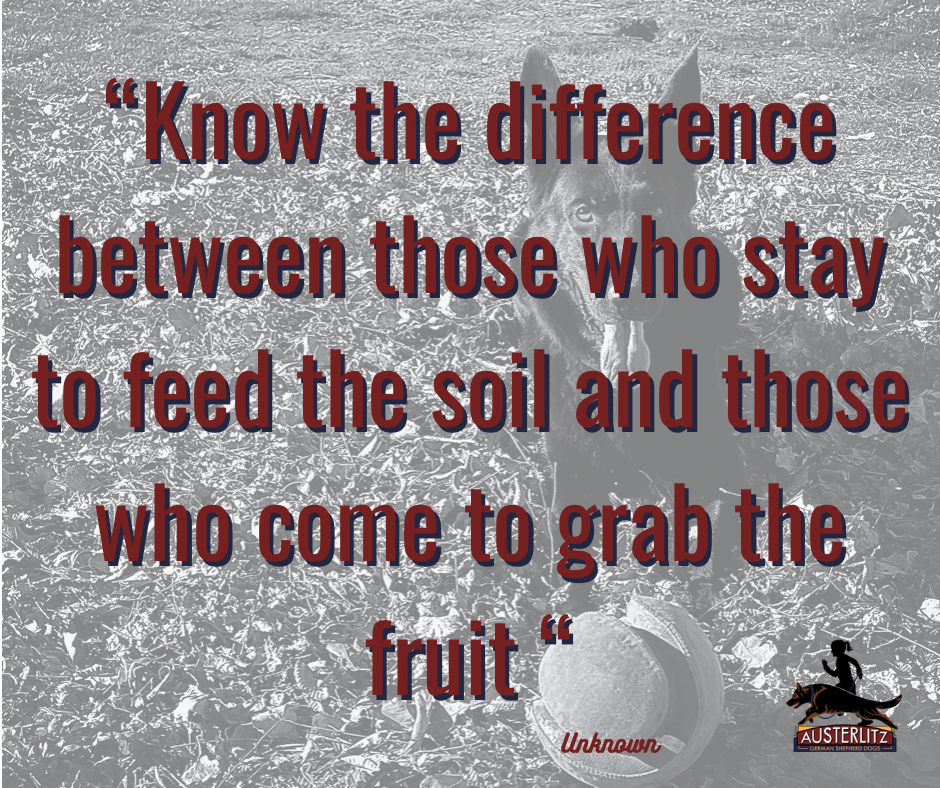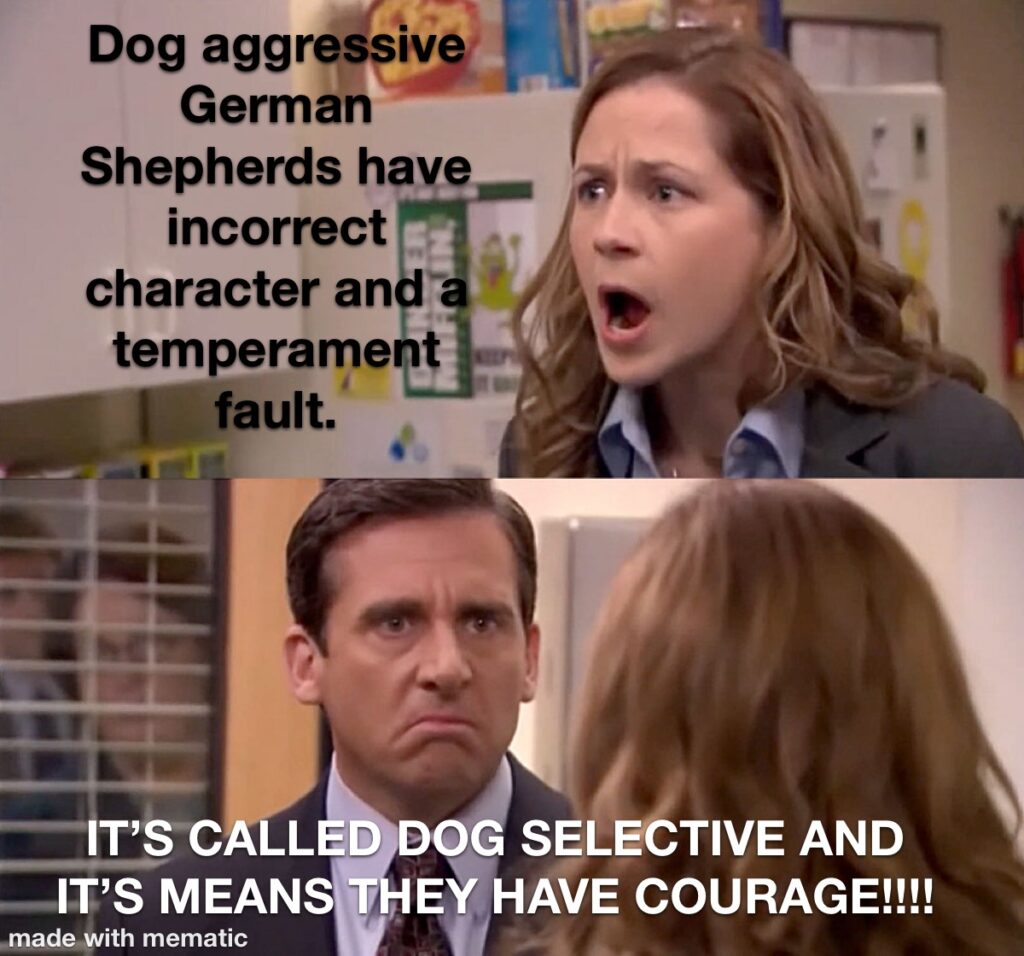When Big Feelings are a Big Problem: Dog Aggression in the German Shepherd.
Recently I posted my thoughts on Facebook on the increase in genetic (versus learned) dog reactive and dog aggressive behavior in the German Shepherd Dog. This post cause quite a range of emotional reactions and hopefully triggered some self reflection on the part of the breeders who read it.
I remember when I got my first German Shepherd, Quinta v Westfork, in the early 1990s. Quinta was everything a German Shepherd should be, as were many dogs in those days. While there were some problems with temperament one thing we didn’t regularly see was reactive behavior or aggressive behavior towards other dogs. Over the decades I have seen a steady increase in various levels of dog intolerance, especially in the working line dogs. Even more concerning is that far too many younger breeders are excusing this type of temperament problem as being ”normal” for the breed.
Breeders have a responsibility to ”do no harm” to their breeds and ideally breeders have the insight to recognize where improvements are beneficial to a breed, and the skill to improve those problem areas.
While working line breeders have put considerable effort into “improving” traits, behavioral and physical, that increase talent for high scores in dog sport, and move the GSD closer to the Belgian Shepherd in build and character they have largely ignored, or even excused, the faults of structure and character that have occurred alongside these performance motivated changes.
Breeders owe it to their breed to Do No Harm, this means undesirable traits must be identified, called out as incorrect, and then changed to align with the breed standard by placing selection priority on those dogs who exhibit the Natural, Good Natured, and Self Assured, traits the standard describes and deprioritizing dogs who exhibit incorrect character or temperament in regards to their natural instinctive dog social nature. The German Shepherd is not a hyper social dog, they don’t need to enjoy the local dog park, but there is no excusing dogs who are incapable of tolerating benign behavior from novel dogs, or living in multi dog environments. Only when breeders, and puppy buyers, stop tolerating these incorrect traits will the GSD return to the stable, good natured, confident, enjoyable companion they are meant to be.
This is how we know who is truly guarding and preserving a breed, and who really just enjoys what a breed can do for them. One of these loves a breed and can be entrusted with it’s preservation, the other loves an activity and should not be In the drivers seat of a breed.

You can read the original thread on FB here:
I’m seeing way too many people justifying incorrect temperament and faulty character in the GSD. These justifications by BREEDERS lead to an increasingly difficult and unpleasant breed to own, one that is a risk instead of benefit to society, and that is the exact opposite of the “helper” type of dog the founders of breed intended and further it’s the opposite of what modern owners need and what modern dogs need to live happy and rich lives.
The GSD breed standard for character and temperament never mentions this breed should be aggressive towards humans, dogs, or anything else. Nor does it mention sport traits, or complicated and difficult temperament.
This breed should never require intense management, or butt tons of equipment to prevent harm to it’s bonded family members (human or otherwise), to protect the dog from itself, or to protect society from the dog.
What it does mention specifically is the GSD must be:
- Well balanced with strong nerves
- Self assured
- Absolutely natural
- GOOD NATURED
- Attentive and willing to please.
“The German Shepherd Dog must be well-balanced (with strong nerves) in terms of character, self-assu- red, absolutely natural and (except for a stimulated situation) good-natured as well as attentive and wil- ling to please. “ WUSV/FCI standard
They must posses:
- Instinctive behavior (we would call this drives, herding drive, prey drive, defensive drives, social drives)
- Resilience
- Self assurance
Why? In order to be:
- A good companion (yes this is first!)
- Guard
- Protection, service, and herding dog.
*Notice “sport dog” isn’t even mentioned.
“He must possess instinctive behaviour, resilience and self-assurance in order to be suitable as a companion, guard, protection, service and herding dog.” WUSV/FCI standard.”
When breeders begin justifying faults of character they will include such undesirable dogs in their breeding program with NO attempt to improve the fault and bring future generations back in line with the standard. They come to believe that the faulty temperament is normal for the breed and if enough breeders are influenced in this way it causes the entire breed to shift.
Further damage is done when novices who don’t know the standard and who don’t remember when GSDs wasn’t an aggressive sh it show are influenced, and they in turn buy these incorrect dogs and impact society with them, damaging the breed’s reputation and if they become breeders perpetuating incorrect temperament and faulty character.
To be clear, the GSD should never require a neck full of devices to be a pleasant companion, they should never require a muzzle to take a walk in the park, they should never need a four figure training package and a lifetime of “tune ups” to be manageable as a companion.
Owners should never fear their GSD injuring or killing some random dog that rudely runs up on them in the park, they should not be afraid of their dog or what it might do if life happens.
Such dogs are a burden to their owners and a danger to society, the exact opposite of what this breed should be. We should never accept this as desirable.
Is balancing the complicated behavioral traits difficult for breeders? Of course, everything about breeding is difficult.
Does that mean we should justify these faults? Absolutely not, a willingness to bite unprovoked, along with weak nerves (and yes, if your GSD is unplugged emotionally because a mini golden doodle tries to kiss it at the park or because “dogs exist” they have weak nerves) is an exclusionary fault for our breed.
Dogs with minor faults can and should be included in our breeding programs, we can and should be striving to improve these faults and not ignore them, and for the love of the breed we should never ever justify them.
This breed should be natural, self assured and resilient, not an insecure, over reacting, bite risk.
Do better.

